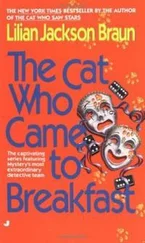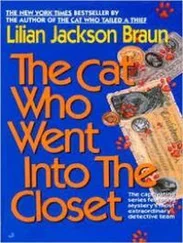It was midnight when we arrived home, and as we drove into our quiet street my anxiety turned to terror. The porches, sidewalks, and lawns were teeming with neighbors. They were tramping about and waving their arms in indignation. They were protesting something. They were protesting a screeching, blasting, thumping performance of hard rock, and it seemed to be coming from our house.
A police car with lights flashing pulled up at our door. “What’s the idea?” one officer demanded. “Do you think that’s a responsible thing to do?—go out and leave the radio blarin’ like that? You look like people who should know better.”
The noise coming from Howard’s stereo was ear shattering, and he made a dash for the controls while I tried to explain to the police and apologize to the neighbors. “We knew something was wrong with the stereo,” I told them. “Sometimes it works, and sometimes it doesn’t, but we never anticipated anything like this.”
Poor Sin-Sin! She seemed to be suffering most of all. She was huddled under a bed, obviously displeased with the noisy household into which she had been thrust, but she allowed Howard to draw her out from her hiding place and stroke her fur. Clearly he was proud of his success in comforting the sensitive little animal.
We all felt better the next morning. When we sat down for a leisurely Sunday breakfast, Sin-Sin entertained us by cavorting with some little plaything she had found. (It later proved to be a piece of my typewriter.) She had eaten her breakfast hungrily and was finally accepting her new environment. We beamed with pleasure.
“By the way,” Howard said, “if you want that toaster to work, you’d better plug it in.”
“That’s strange,” I said as I pushed the plug into an outlet. “I was sure I connected it.”
At that moment we both jumped from our chairs as a solemn voice in the family room loudly announced: “We will all join in singing Hymn Seventy-three,” and a church organ thundered the opening chords.
We sprinted for the stereo, and what we saw was difficult to believe. Sin-Sin was pawing the controls.
“Amazing!” I gasped.
“Incredible!” said Howard with awe and delight and a little pride. “She’s pretty clever, isn’t she?”
That was only the beginning.
Back at the breakfast table we were discussing the smart little kitten when we saw her crouch momentarily, rise effortlessly to the kitchen counter, and disconnect the coffee maker. Clamping her teeth on the plug, she gave it a businesslike yank—then jumped down and walked away, her tail waving with satisfaction.
Geraldine’s letter had been quite accurate; Sin-Sin had a remarkable mechanical aptitude. We sincerely hoped this sophisticated young thing would know enough to avoid electrocuting herself.
What she could not do with her claws, she did with her teeth. Her powerful little jaws were like pliers, and she was attracted to anything that was operable: knobs, push buttons, levers, latches, switches. Confronted by any mechanical device, she cocked her head and looked at the challenging contrivance sideways until she figured it out.
The kitchen was her favorite playground—a garden of tempting delights. When she started studying the touchtone telephone on the kitchen counter, we tried hiding it in a drawer, but Sin-Sin discovered that the drawer opened easily on nylon rollers. So we put the phone in a wall cabinet, and there it was safe—as long as we wired the door handles together. This arrangement hardly made for convenience, but I shudder to contemplate our long-distance bill if we had not taken precautions.
“It’s only for a few weeks,” Howard reminded me.
In the weeks that followed, Sin-Sin disconnected all the lamps daily and the refrigerator occasionally. One afternoon while left alone she discovered the electric coffee grinder. She ground up all the coffee beans in the hopper and burned out the motor.
Push buttons marked OFF had no allure for her, it seemed; the ON buttons activated little red or green lights and produced the buzzing and whirring and growling that made her efforts worthwhile. She particularly enjoyed turning on one or more television sets in the middle of the night, filling darkened rooms with noise and flickering light.
In our open-plan ranch house with no basement it was difficult to lock this industrious animal in or out of any area, but bathrooms were definitely off-limits after the hands on the water meter started spinning like pinwheels. Sin-Sin liked to bump the faucets and watch the swirling water in the washbowl, and she could sit for hours on the toilet tank, contentedly flushing. Scolding was useless; the little charmer merely blinked her angelic blue eyes until I melted and gave her a hug.
In time we learned to forestall her mischief, hiding small appliances, camouflaging large ones with rugs or blankets, and devising catproof expedients with wire or duct tape. Howard had not touched his stereo for weeks!
“Let’s get a cat of our own when Sin-Sin goes home,” he said, after she had untied his shoelaces for the fortieth time.
As her visit drew to a close, we congratulated ourselves. We had kept her from meeting other cats or committing suicide or burning down the house.
Sin-Sin had one more surprise in store for us, however. Two days before my sister was due to return from Europe, Sin-Sin came of age. She announced the delicate situation at the top of her voice. Her wailing and howling verged on hysteria and continued nonstop for hours. Even though we kept the windows closed, her vocal exercises penetrated the walls, and the reaction around the neighborhood ranged from simple fury to threats of lawsuits.
In desperation we telephoned a veterinarian at his home in the late evening. He said: “That is characteristic of Siamese queens. You’d better mate her or she’ll drive you crazy.”
“I can’t,” I explained. “My sister in St. Louis has plans for breeding her.”
“Then put cotton in your ears, and bring the cat to the clinic in the morning. I’ll give her a tranquilizer.”
Howard and I took a couple of pills ourselves. Then we locked Sin-Sin in the utility room, after wiring the laundry faucets and disconnecting the washer and dryer.
The utility room was farthest from the bedroom, but it was not far enough, and the pill was not effective enough to counteract the bedlam that waked me a few hours after midnight. It was worse than Sin-Sin’s howling. It was a cacophony of screaming, growling, snarling—like the sound effects from a horror film. I half fell out of bed and groped my way to the utility room, at the same time shouting to wake Howard. As I opened the door, showers of sparks swirled around me. Red sparks and white sparks were shooting about in the dark like fireworks, amid a bedlam of crashing and clattering. While I stood there in dumb panic, the sparks stopped churning and hovered in space. And then I realized that the little red lights and the little white lights were arranged in pairs, like eyes.
Howard stumbled sleepily into the room and found the light switch. The sparks disappeared, and the room was full of cats—cats on the washer, cats on the dryer, cats in the laundry tubs, and one hanging from the circuit breaker box. They were inside, underneath, and on top of the wall cabinets. Gray cats, black cats, orange cats, striped cats, spotted cats glared at us in indignation.
In the middle of the assemblage was Sin-Sin, looking bewildered but proud. By opening the milk chute she had admitted the entire tomcat population of the neighborhood.
We shipped Sin-Sin back to St. Louis with an explanation that was not well received by Geraldine, and eventually my ungrateful sister shipped us all four of Sin-Sin’s mismatched offspring.
All four kittens were remarkably adept at operating mechanical devices—not as advanced as their mother, but far superior to the barn cats and lap cats of an earlier era. Furthermore, each succeeding generation has exhibited increased capabilities. Can this technological sophistication be attributed to watching television instead of mouseholes? Or is it the result of nutritional improvements in catfood? It is a trend worth watching, and we are in a position to monitor it closely.
Читать дальше












